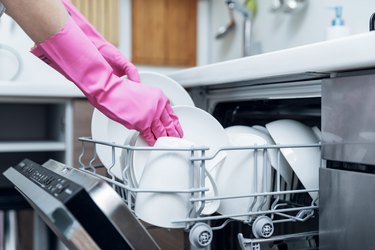
If your dishwasher is leaving a brown residue, it may just need a good cleaning, but that's not the only possible reason for brown discoloration. Dissolved minerals in the water, specifically manganese and iron, can turn the water yellow or brown, and these deposits can remain after the water has evaporated. It would be unusual to find these deposits collecting on your dishes but not so unusual to find them on the inside of the dishwasher.
Mold is another possibility. Using the dishwasher infrequently and keeping the door closed between uses gives mold a chance to establish itself on the door gasket, rotor and other parts that aren't completely smooth. Mold loves the moisture inside a dishwasher, and once established, it can be hard to wash away.
Video of the Day
Video of the Day
You can handle all of these problems by scrubbing the inside of the dishwasher, giving it a treatment with a disinfectant, such as vinegar, citric acid or baking soda, and manually cleaning any part that you can remove and wash in the sink.
Are You Sure the Dishwasher is Working Properly?
A Hotpoint, Whirlpool or Bosch dishwasher not cleaning properly, or one from any other manufacturer, for that matter, could be due to the dishwasher itself. The circulation pump could have a loose seal or worn belt, the wash arms could be malfunctioning or the water inlet valve could be blocked. Any of these issues could be responsible for the dishwasher leaving gritty residue and/or brown gunk on your dishes.
Taken together, brown residue, strange noises and poorly cleaned dishes are a sign the dishwasher needs service, but it's wise to leave the detailed diagnosis to a pro. Some disassembly will probably be required to get to the bottom of the problem, and if a part needs replacing, a licensed technician will know which part and where to get it. It might cost a bit, unless the dishwasher is still under warranty, but calling a pro is the best way to ensure the repair is done correctly.
What to Do About Hard Water
Iron and manganese in the water don't usually leave residue per se, but they do cause brown and yellow stains. If you have hard water, the stains will probably be showing up elsewhere, such as in the toilets and sinks, as well as the dishwasher. A recommended way to eliminate minerals from the water supply is to install a water softening system.
To clean these stains from the dishwasher, fill the soap dispenser tray with vinegar or citric acid crystals and run the machine through a wash cycle — with no dishes in it, of course. If this doesn't work the first time, try it two or three times in a row. It sometimes takes time to dissolve the mineral compounds that form the stains.
DIY Dishwasher Cleaner
Other than mineral stains, you can usually clean off any other brown residue, including mold, by scrubbing with detergent and water. If you suspect mold, add some vinegar to the cleaning water, and after you're done scrubbing, run the machine through a cleaning cycle after putting vinegar in the dispenser tray. Vinegar cleans and disinfects mold as well as bleach, which isn't great for your dishwasher or your dishes.
The residue could be forming simply because you aren't rinsing your dishes well enough before putting them in the dishwasher. If so, you should remove the filter from the bottom of the dishwasher periodically and wash it in the sink just to make sure food residue isn't circulating through the dishwasher and collecting on your dishes.